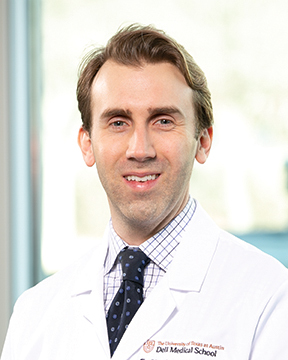
E. Charles Osterberg III, MD, FACS
Chief, Urology
Urologist, Reconstructive Urology, Urology
Spanish
Northwestern University Feinberg School of Medicine, MD
Northwestern University, BS, Communication Sciences and Disorders
Internship & Residency, Urology, New York-Presbyterian Hospital/Weill Cornell Medical College
Fellowship, Genitourinary Reconstruction and Trauma, University of California, San Francisco
Clinical Biography
E. Charles Osterberg III, MD, FACS, is a board-certified urologist and serves as the Chief of Urology, a clinical partnership between Ascension Seton and UT Health Austin. He specializes in reconstructive urology, genitourinary trauma, prosthetics, and robotic surgery. Additionally, Dr. Osterberg is an assistant professor in the Dell Medical School Department of Surgery and Perioperative Care.
Dr. Osterberg earned his bachelor’s degree in communication sciences and disorders from Northwestern University and his his medical degree from Northwestern University Feinberg School of Medicine and He completed both an internship and residency in urology at New York-Presbyterian/Weill Cornell Medical College and a fellowship in genitourinary reconstruction and trauma at the University of California, San Francisco.
Dr. Osterberg was the first fellowship-trained male reconstructive urologist in Central Texas who focuses exclusively on male urethral stricture disease. He also has a special interest in penile implant surgery, Peyronie’s disease, robotic ureteral reconstruction, and complications of prostate cancer treatment, including bladder neck contractures, rectal fistulas, and incontinence (artificial urinary sphincter placement). He is passionate about treating complications from prior urologic surgery, such as urethral strictures, radiation injury, genital lymphedema, stress incontinence, erectile dysfunction, urinary fistulas, voiding dysfunction, and penile curvature. He is an author of more than 90 peer-reviewed publications, which have appeared in some of the most prestigious medical journals, including JAMA Surgery, the Journal of Clinical Oncology, and The Journal of Urology, as well as several textbook chapters. He currently serves as an expert reviewer for The Journal of Urology and Urology, the official journal for the Genitourinary Reconstruction Society. He has also been invited to give national and international lectures on urologic reconstruction. He is an active member of the American Urological Association and the Society for Genitourinary Reconstructive Surgeons. He also serves as a diplomat to the American Board of Urology and is a fellow of the American College of Surgeons.
Dr. Osterberg is a urologist with Ascension Medical Group.
Specializations
- Benign prostatic hyperplasia (enlarged prostate)
- Complications of prostate cancer treatment (e.g., bladder neck contractures, rectal fistulas, and incontinence)
- Genital lymphedema
- Erectile dysfunction
- Penile curvature
- Penile implant surgery
- Peyronie’s disease
- Radiation injury
- Robotic ureteral reconstruction
- Stress incontinence (leakage of urine)
- Urethral strictures (scar tissue of the urethra)
- Urinary fistulas
- Voiding dysfunction
Board Certification
- American Board of Urology
Awards & Honors
- Altmetric Top 100 Most Cited Research Publication
- Austin Monthly Top Doctor
Locations
Health Transformation Building
1601 Trinity Street, Bldg. A, Suite 704F
Austin, TX 78712
View On Map
Clinical Research/Studies
Dr. Osterberg’s primary clinical interest involves outcomes following urethral reconstruction surgery. He hopes to understand the factors that lead to more successful surgeries and identify which of these factors are most important to patients. He maintains a prospective repository of patient data who have undergone this type of surgery. Recently, he published that scar tissue return and complications after urethroplasty are not uncommon. Obesity and lichen sclerosus were associated with worse outcomes, while scar tissue in the penis was associated with better outcomes when a mouth graft was used. His hope is that his research will help other urologists who specialize in urologic reconstruction provide better care for their patients and improve patient outcomes.